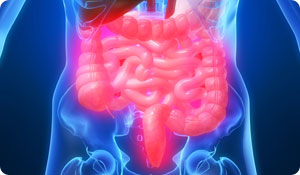
Your digestive system is a complex mechanism made up of hollow organs that begins in your mouth and continues to your esophagus, stomach, small intestine, large intestine (also called the colon), rectum, and anus. When you eat, food is not in a form that your body can use as nourishment. Therefore the foods and liquids you consume have to be changed into smaller molecules of nutrients before they can be absorbed into your blood and carried to cells throughout your body to nourish cells and provide you with energy. When there's a disruption in this digestive process, it's referred to as dysbiosis. When the intestines are balanced with good and bad bacteria, which is optimal for good health, it is described as being in a state of symbiosis. The opposite—dysbiosis—can be the result of either not enough good bacteria or too much harmful bacteria.
Symptoms of Dysbiosis
When the digestive system is out of balance, you may experience:
- Bloating, belching, and gas
- Indigestion, diarrhea, constipation (signs of irritable bowel syndrome or Crohn's disease)
- Rectal itching
- Weak or cracked finger nails
- Iron deficiency
- Chronic intestinal infections, including parasites and yeast
- Undigested food in the stool
- Greasy stools
- Fatigue
- Skin that's easily bruised
Any number of things can upset the balanced ecology of your intestines including:
- Stress
- Diets that lack good nutrition or may be overloaded with carbohydrates, fat, or animal products
- Frequent antibiotic or drug therapy
- A suppressed immune system
- Intestinal infections
- Inflammation
Treatment
If you suspect that you may have dysbiosis, make an appointment to see your doctor. She will give you a physical exam and prescribe a series of tests, including a stool analysis and gut fermentation lab tests to determine if you have a bacterial overgrowth problem. If so, your doctor may recommend a change in your diet such as replacing simple sugars and grains with ones that are low in fruit and starchy vegetables in order to restrict the nutrition available for bacteria overgrowth in the upper GI tract.
Your doctor may also prescribe antibiotics, such as metronidazole, tetracycline, or ciprofloxacin, to get the bacterial overgrowth under control, although these medications also run the risk of causing the unhealthy growth of intestinal bacteria.
Sources:
http://www.ei-resource.org/treatment-options/treatment-information/antibacterial-treatment/





